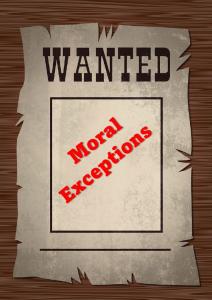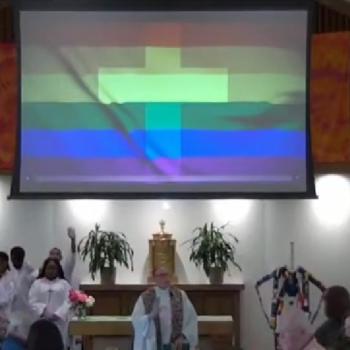As a “conservative” Catholic, I often get pushback from “progressive” Catholics. They claim I am too Pharisaical, too judgmental, too imprudent, or just plain rude. Our ethical standards appear miles apart, yet we share the same Catholic Church. Why do they think I am rude? Well, I think Catholic moral teaching applies to all Catholics, regardless of situation or circumstance.* The word catholic means universal, therefore Catholic moral teaching applies universally to all Catholics.
In this article, I put forth, according to my reading of progressive Catholic blogs and reading progressive Catholic books, what progressive Catholics want. Now, I invite any progressive Catholic to add this list or provide a correction with adequate references.
A Welcoming and Affirming Church
To me, a welcoming and affirming Church represents the biggest push amongst progressive Catholics. When one reads progressive voices at US Catholic’s Peace and Justice page, articles like this at The Catholic Reporter, and ones like this at Where Peter Is, the impression holds. Furthermore, when progressives speak of the “dignity of the human person,” this concept often pairs itself with the “marginalized,” especially those who identify as LBGTQ. For many progressive Catholics, to denying an LGBT person their full identity within the Church constitutes a violation of their human dignity.
A Conservative Catholic Response to a Welcoming and Affirming Church
To a conservative Catholic, this approach assumes much. It assumes God made someone with the inability to follow His salvific plan. Not that heterosexual sex is salvific. No. Many progressive Catholics assume God made some people LGBTQ, therefore, they do not possess the ability to not commit what the Church calls sin (sex outside of marriage between two people of different sexes). For some progressives, the Church must not demand something of a person that which they cannot possibly do. To do so goes against that person’s human dignity. To conservative Catholics, and according to Church teaching, this assumption is false. God does not create people with a total inability to accept and follow His salvific plan. Such a belief also rings as deterministic and goes against the Church’s teaching on freewill.
An Environmental Church
Moreover, other progressive Catholics make issues like environmentalism of paramount importance. For example, another writer at Patheos often makes environmentalism a main topic of his writing. He minces no words on how important environmentalism is to him. In the recent article I just linked, the blogger states:
We must promote the way of life, even if it means we must inconvenience ourselves, not only by regulating our own actions, but taking the time to engage the political fight of our times.
According to this, and other progressives Catholics, environmentalism stands as a non-negotiable. Politicians (conservative ones) who stand against radical environmental policy represent an objective threat, not only to the planet, but to the common good of all living on it. Furthermore, as abortion represents the pinnacle of an anti-life ideology for conservative Catholics, environmentalism occupies this space for progressive Catholics. Moreover, they often criticize those pro-life conservative Catholics as uncompassionate for not supporting progressives’ political polices or “safety nets,” even though the politicians behind them hold extreme views on abortion. Views the Catholic Church soundly condemns.
A Conservative Catholic Response to an Environmental Church
As a conservative Catholic, a Catholic who considers himself a faithful son of the Church, I do not oppose environmentalism, especially as reflected in the writing of Pope Francis. His Laudato Si stands as an authoritative teaching of the Church, which I accept. I stand with him when he states in paragraph 60 that we must avoid the extremes that environmental issues will “solve themselves” and “the presence of human beings on the planet should be reduced and all forms of intervention prohibited.” However, environmental policies in the US usually come with progressive politicians who also hold extreme views on abortion and gender ideology in direct opposition to Church teaching. Imagine all the environmental goods we could accomplish if these progressive politicians gave up such extreme views. And let’s not forget this viral speech recently given by liberal comedian Konstantin Kisin at The Oxford Union Debate Club.
The Morally Nuanced Church of Amoris Laetita
Moreover, some progressives see the teaching of Pope Francis in Amoris Laetita as an allowance towards a more nuanced and “pastoral” view towards complex moral issues, like remarried Catholics without annulment and other Catholics existing in irregular (same-sex) relationships. The push here is for their full participation in the Church, especially the Eucharist, regardless of whether they exist in unrepentant mortal sin or not. We even see this approach with progressive Church prelates. San Diego bishop, Robert Cardinal McElroy, in his January 2023 article for America, stated:
The distinction between orientation and activity cannot be the principal focus for such a pastoral embrace because it inevitably suggests dividing the L.G.B.T. community into those who refrain from sexual activity and those who do not. Rather, the dignity of every person as a child of God struggling in this world, and the loving outreach of God, must be the heart, soul, face and substance of the church’s stance and pastoral action.
Here, we see again the appeal to “dignity of every person” as a justification for the exceptional application of God’s moral law.
A Conservative Catholic Response to the Morally Nuanced Church of Amoris Laetita
Again, as someone who considers himself a faithful son of the Church, I accept the teaching of Amoris Laetita. But I reject the progressive interpretation of it. This interpretation also contradicts paragraph 307. In this paragraph, the Holy Father states that:
A lukewarm attitude, any kind of relativism, or an undue reticence in proposing that ideal, would be a lack of fidelity to the Gospel and also of love on the part of the Church for young people themselves. To show understanding in the face of exceptional situations never implies dimming the light of the fuller ideal, or proposing less than what Jesus offers to the human being.
Contrary to the “exceptional” application of God’s moral law due to the “dignity of each human person,” the Holy Father makes it clear that to propose something less than what Jesus offers robs the person of their dignity and their due as human beings. Furthermore, the Church cannot allow carveouts for sin because doing so puts souls in jeopardy.
A House Divided…
In closing, let me state that more differences exist between progressive and conservative Catholics, but the ones above represent some major differences. To reiterate what I wrote in the opening paragraph, I think Catholic moral teaching applies universally to all Catholics, regardless of situation or circumstance.* The word catholic means universal, therefore Catholic moral teaching applies universally to all Catholics. This, in my opinion, represents the main difference between the two viewpoints. Furthermore, if one reads the documents produced by the Synod of Synodality and the German Synodal Way, both led and greatly influenced by progressive Catholics who hold the “exceptional” application of God’s law, one sees this difference playing out in real time.
In my opinion, this is the main difference between progressive and conservative Catholics. Progressive Catholics want God’s moral law to apply differently to different people, while conservative Catholics want it applied universally to all Catholics. Can this divide within the Church hold out, or will something occur that tips the scale one way or the other? Time will tell.
*And I include the Catholic principle of Double Effect here.
Thank you!
Read The Latin Right’s other writing here.














